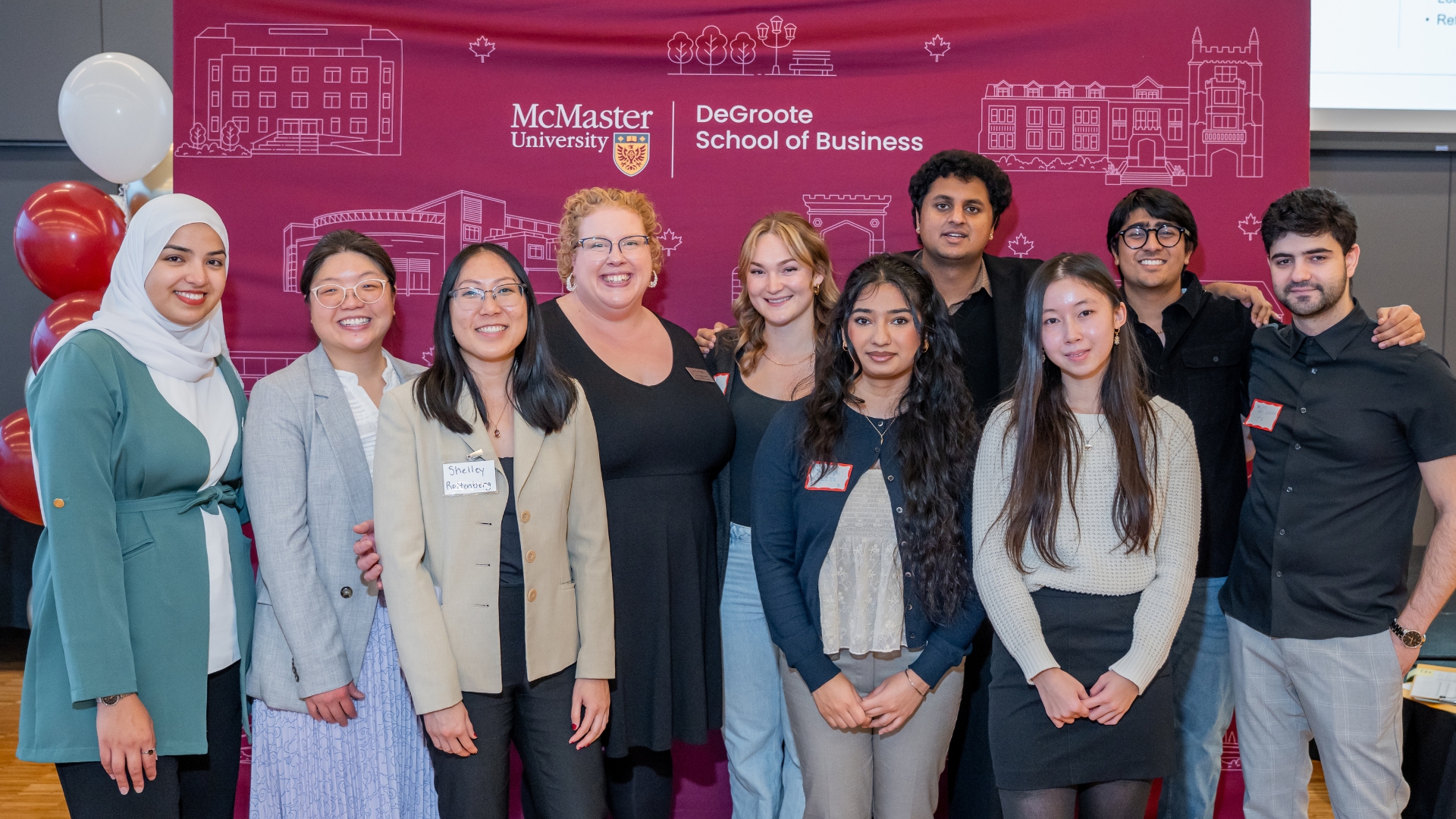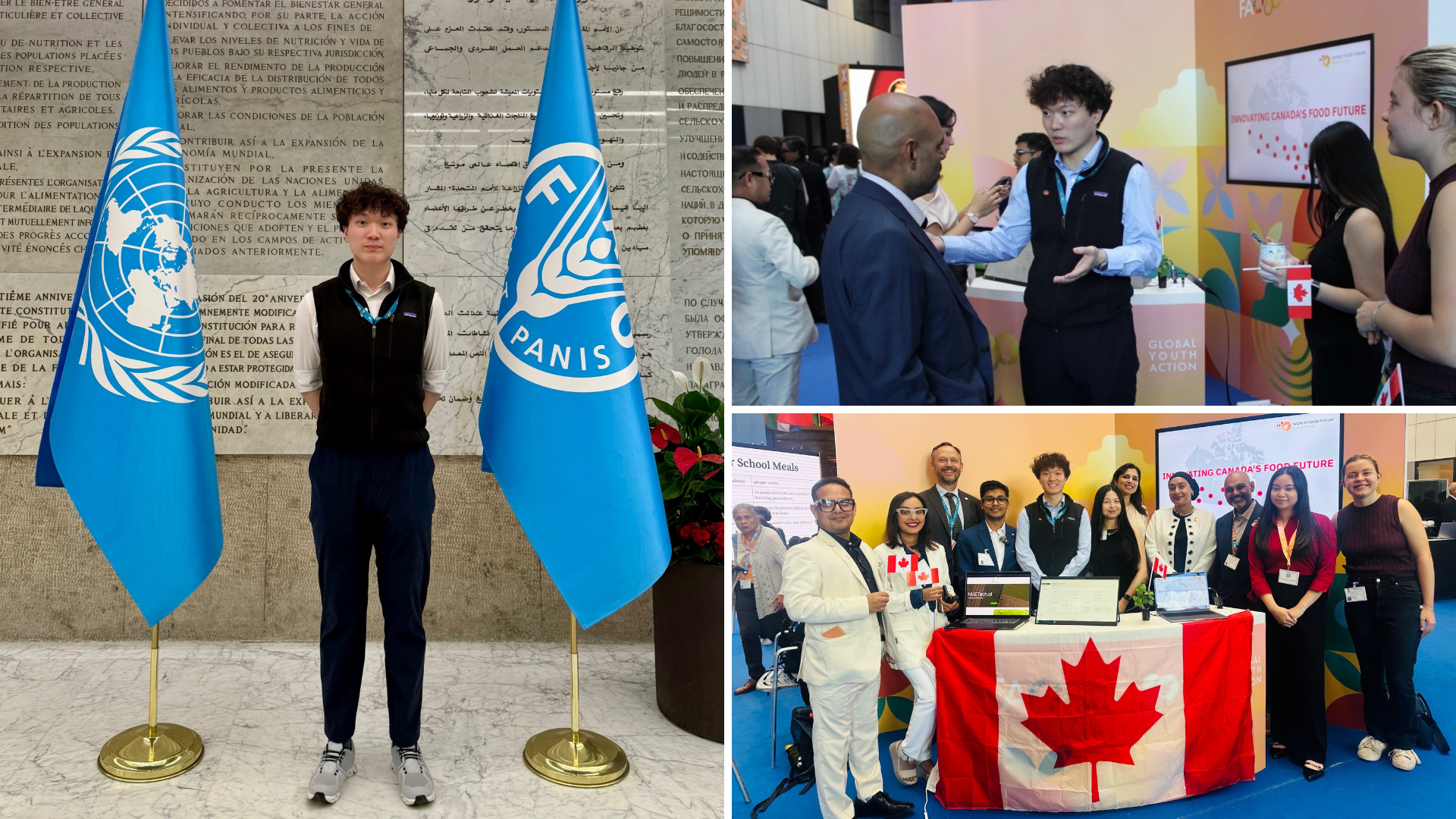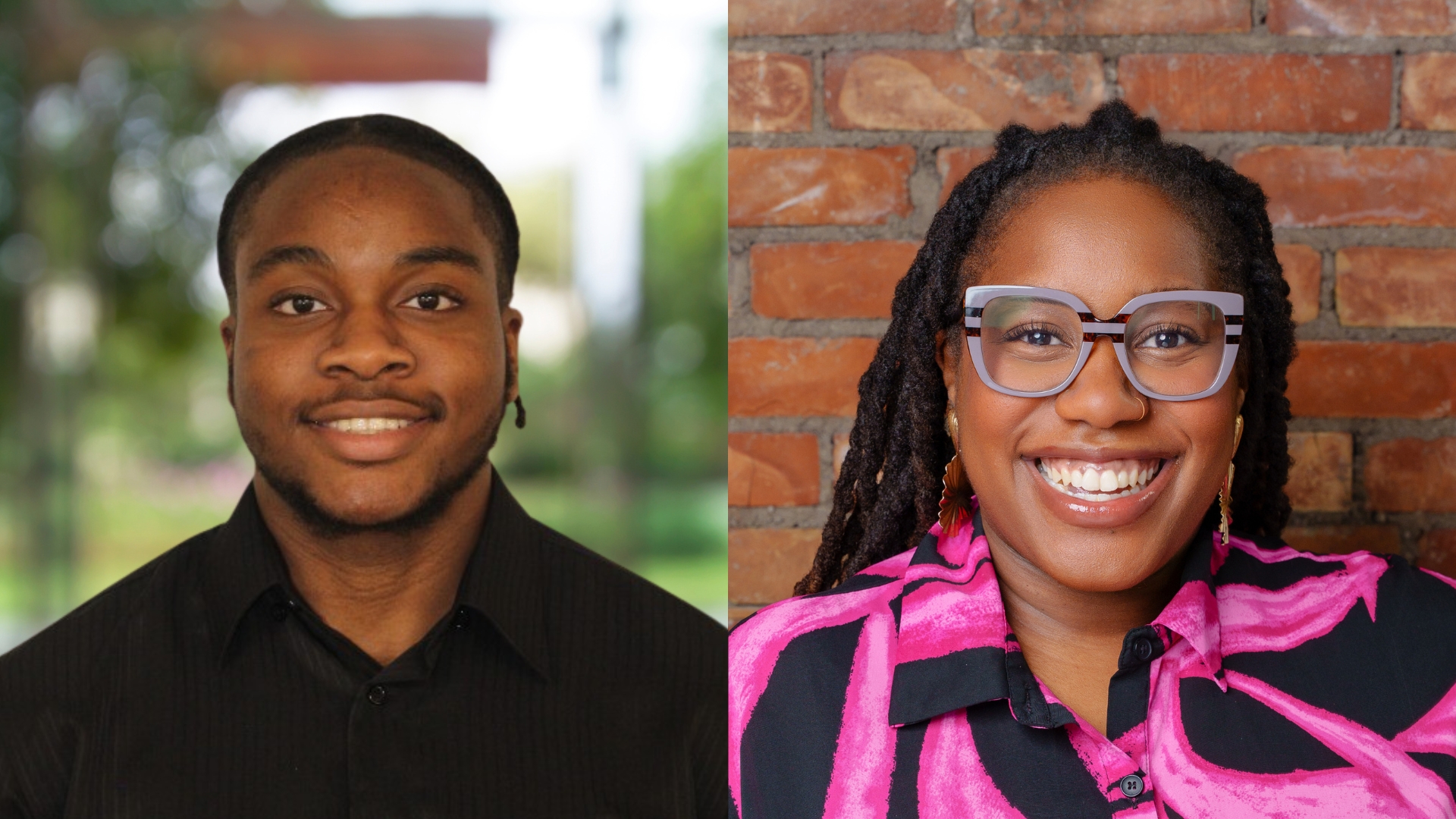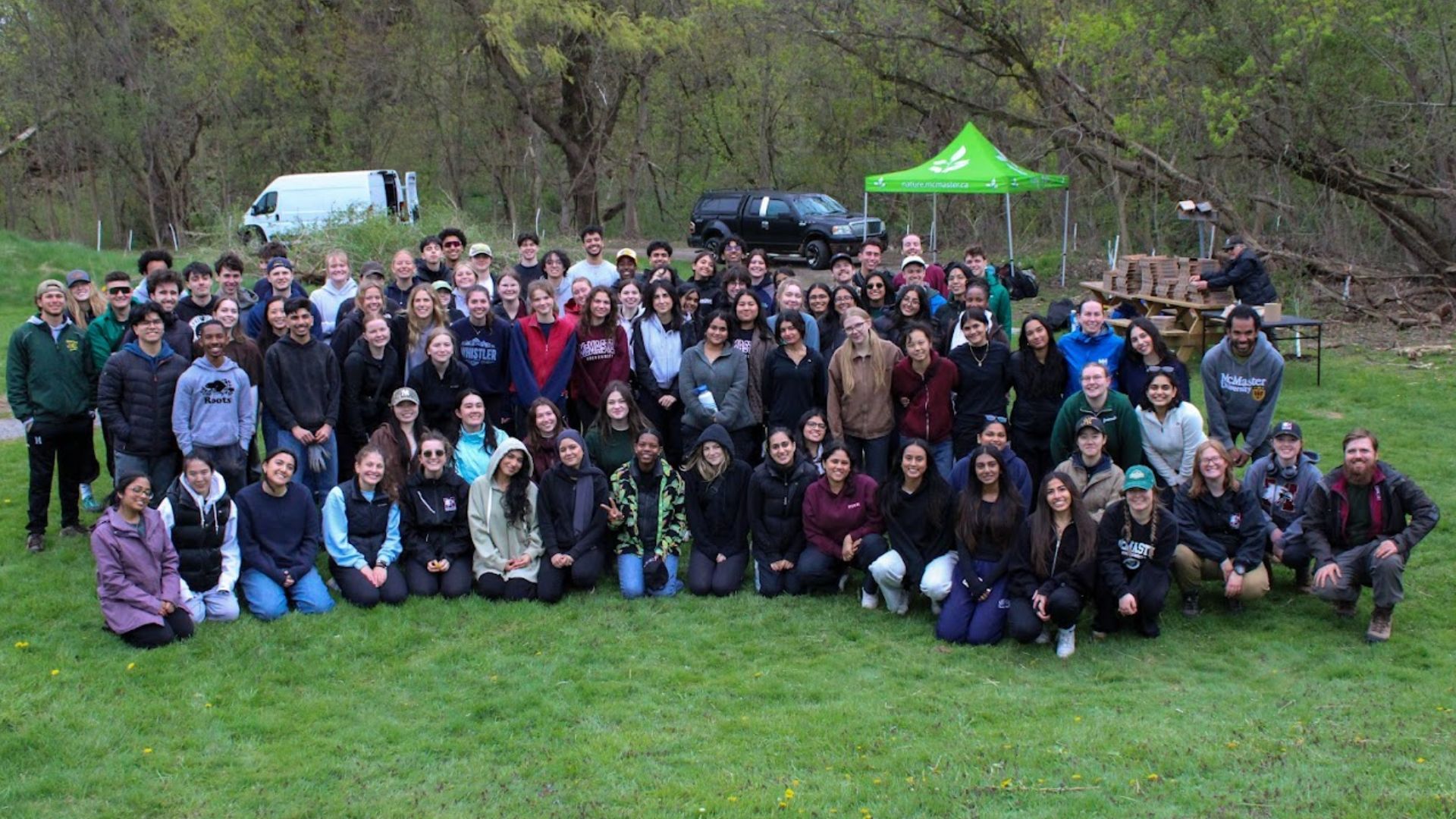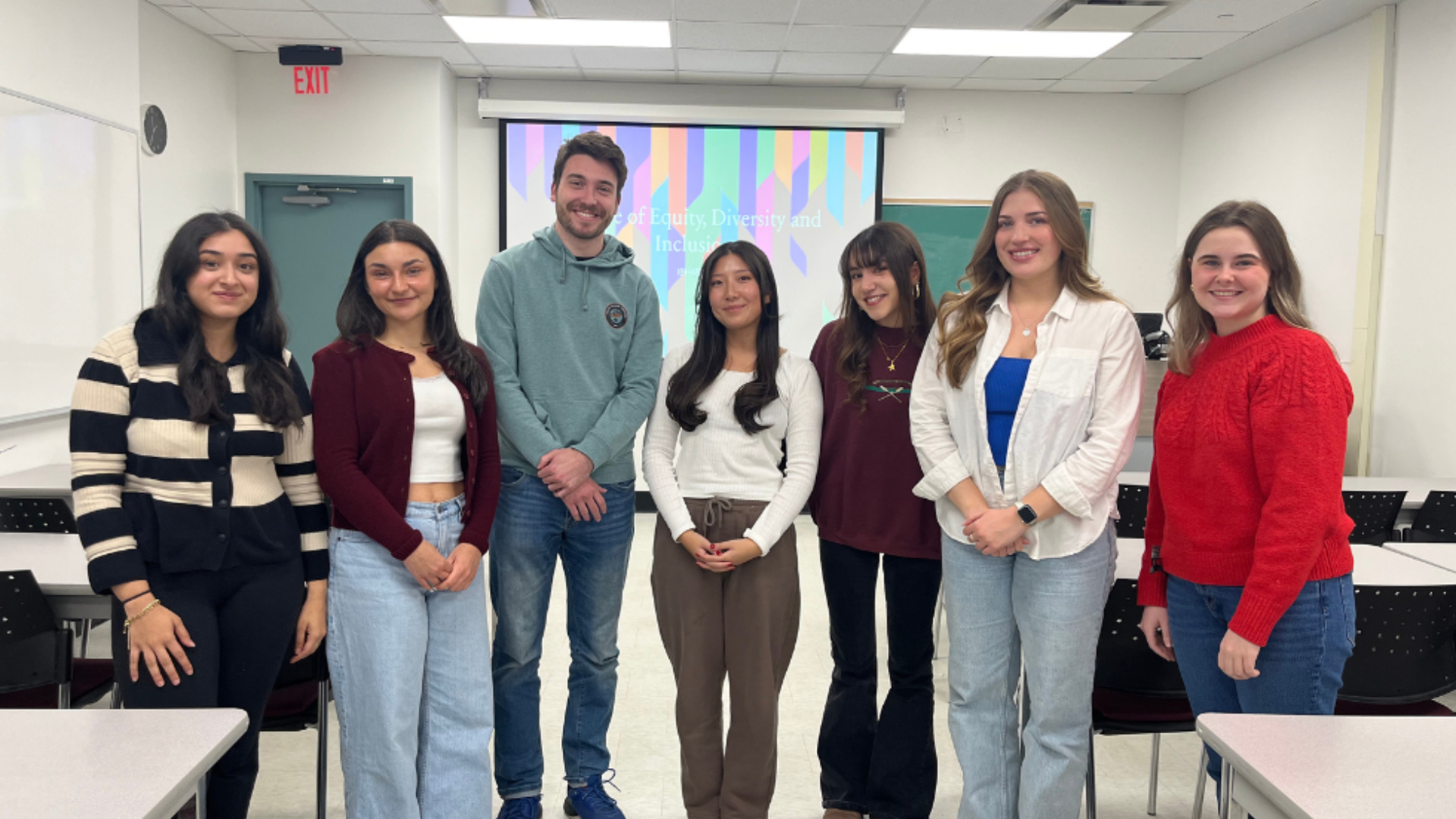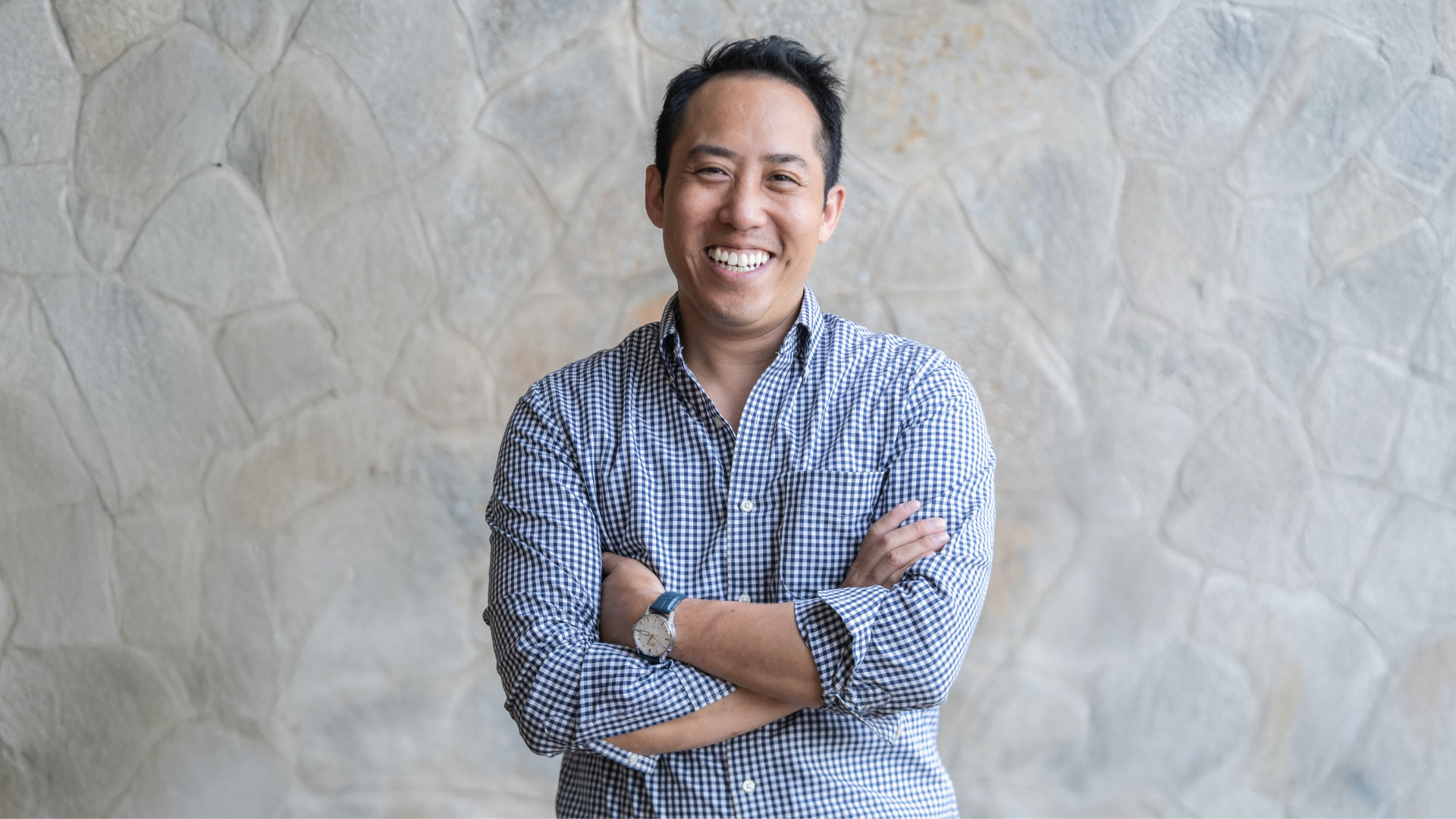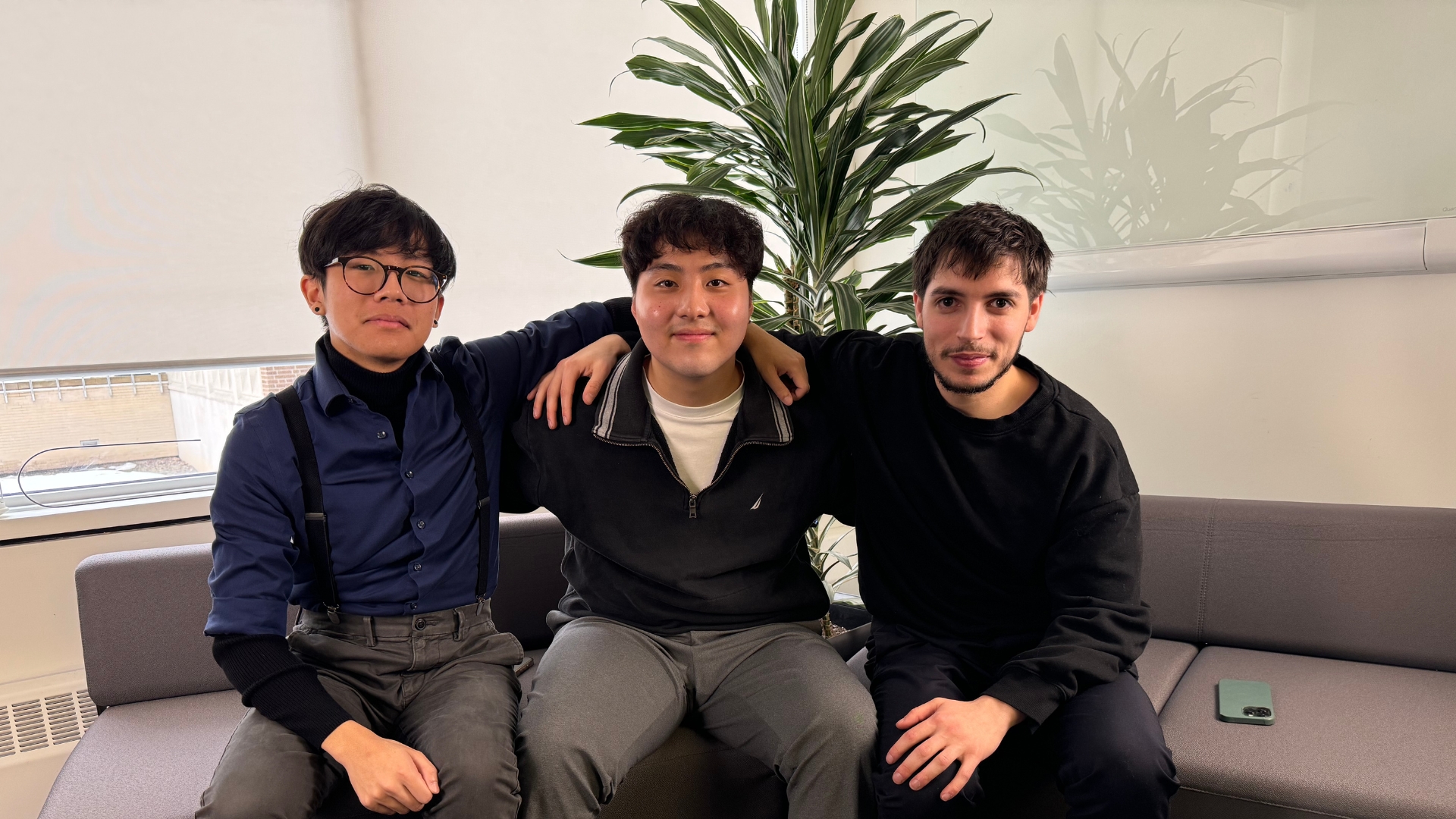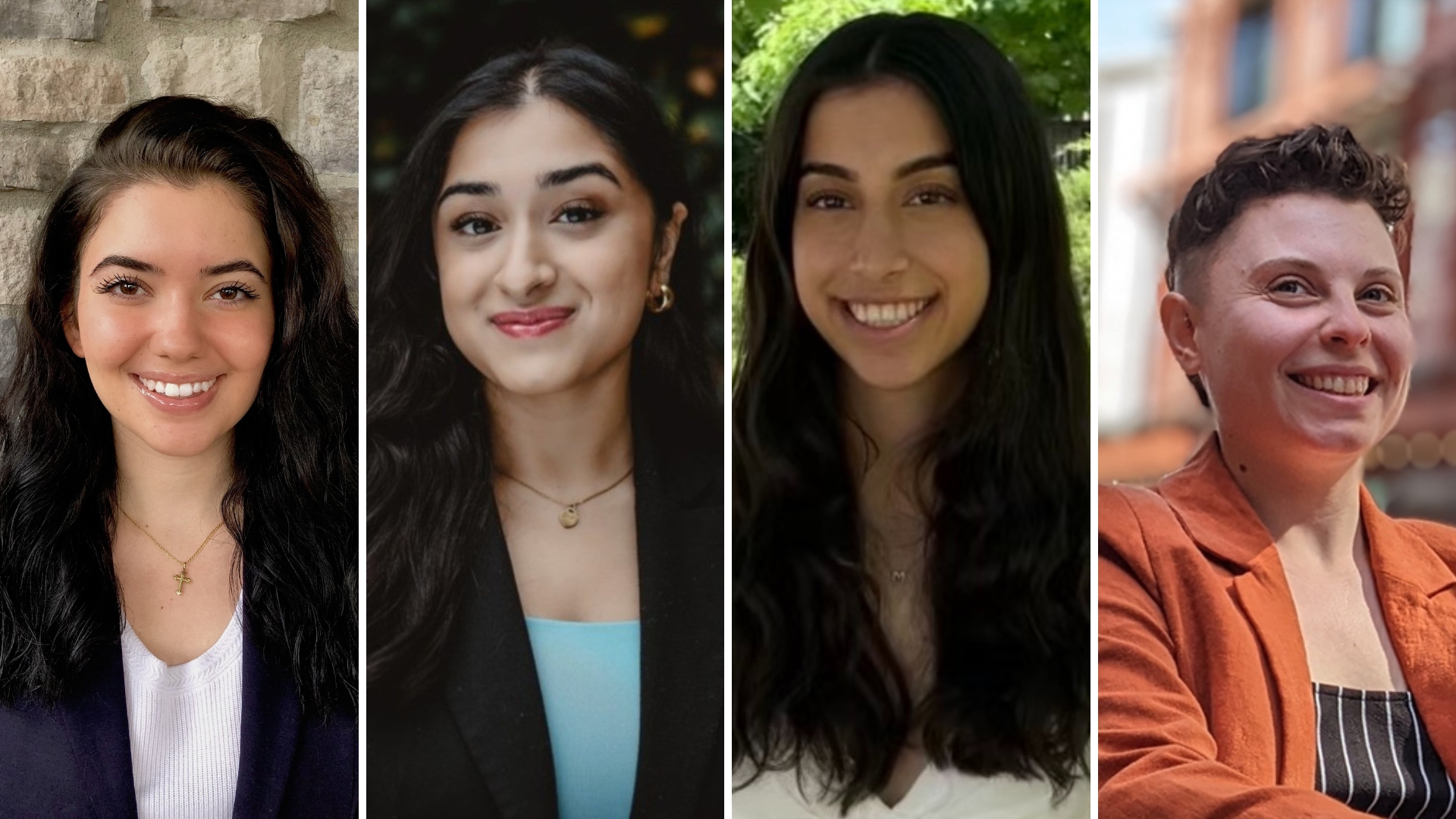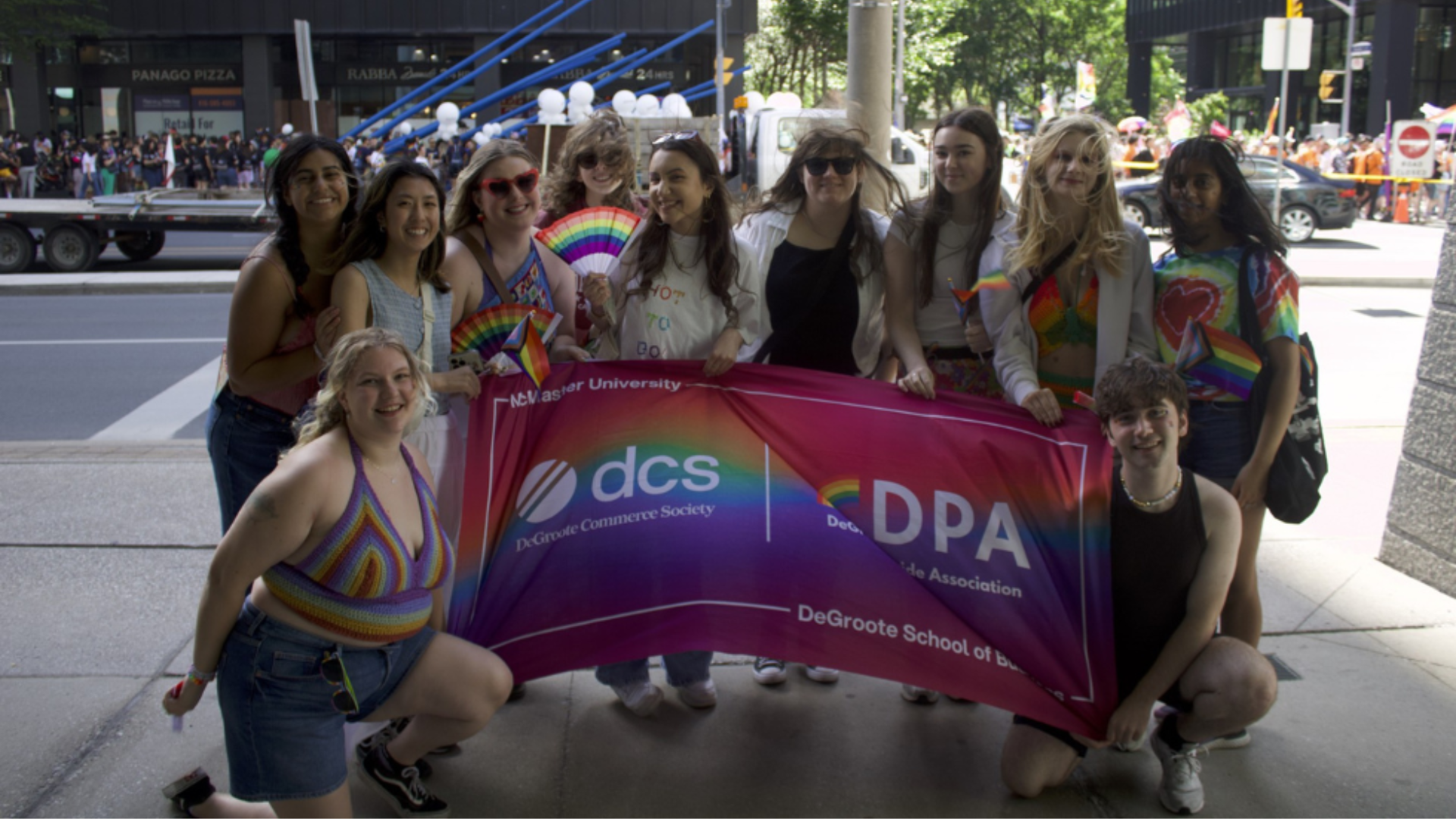RESEARCH STRATEGIC PLAN | RESEARCH AND SCHOLARSHIP STUDENT
From research to impact: DeGroote undergraduate student research day
August 20, 2025 ·
Contributed by: Natalie Plechinger, Communications Assistant

From left to right: Danyal Zaidi, Brooke Sitcoff, George Elchuk, Josh Zadik, Erika Ing, Audrey Zhu, Aishu Bhavan, Maxwell Schaub and Mana Abolghasemi.
On August 6, a group of DeGroote and McMaster undergraduate student researchers joined together to share their research projects. The students’ research explores a diverse range of topics—from precarious employment in the music industry to the impacts of patient aggression on nurses to marketing strategies used in modern gambling—highlighting their commitment to addressing impactful and relevant issues.
“I chose to take on a research position to expand my critical thinking and research skills,” explains Brooke Sitcoff, BCom Level III.
“Before going into this role, I did not know much about what it took to be a research assistant, but it has been incredible to learn about the process. From seeing a project start and reading the initial research articles to seeing it come into play and being eventually published. I really enjoyed my time, and overall, I have learned a lot.”
By exploring diverse research topics students gained numerous skills, applicable to both industry and academic work.
“I had never done research in an official capacity before this experience,” explains recent graduate Josh Zadik (IBH ‘25). “Having the guidance of two professionals who are well established in their field, and experts in conducting research is really valuable to me. I learned a lot, and I have had a fantastic experience due to their guidance and support.”
Student Research Projects
Cloé Cargnelli, BCom Level IV
Project: “The McMaster Centre for Research on Employment and Work”
Supervisor: Catherine Connelly
Research focus: Cloé’s research adopts an interdisciplinary lens to explore how evolving work and workplace dynamics impact diverse groups of workers. Her work spans various employment sectors and populations, including musicians navigating the gig economy, nurses’ experiences with patient and family aggression, and discourse surrounding autism, ADHD and AuDHD.
Skills gained: Qualitative and quantitative data handling, literature review, budget planning and resource allocation.
Brooke Sitcoff, BCom Level III
Project: “Managing in the Post-Covid Economy – Survey Study”
Supervisor: Catherine Connelly
Research focus: Brooke’s research investigates the psychological and social dynamics that contribute to wage theft, focusing on how this issue impacts not only individual managers but also workplace relationships and organizational culture. By examining these effects, Brooke’s research aims to use the findings to develop more effective public and corporate policies to curtail wage theft.
Skills gained: Critical analysis of research articles, better understanding of credibility and accuracy of research studies, attention to detail and ethics applications.
George Elchuk, IBH ‘25
Project: “Supporting Professional Musicians in Canada”
Supervisor: Catherine Connelly
Research focus: George’s research focuses on two parallel studies that investigate employment for professional musicians in Canada, employing both quantitative and qualitative methods. George’s research seeks to understand the effects of unpaid contracts on the careers of Canadian professional musicians, drawing insight from a diverse sample representing various musical genres and tenure in the profession.
Skills gained: Data analysis, ability to conduct research interviews, time management, communication and organization skills, problem solving abilities.
Josh Zadik, IBH ‘25
Project: “Leadership Textbook Review”
Supervisors: Catherine Connelly, Anne St. Amand
Research focus: Josh’s research uses a systematic review to examine the portrayal of Adolf Hitler in leadership textbooks, which lack relevant context about the Holocaust or World War II. Josh’s research seeks to understand how these portrayals may reinforce antisemitism and reflect broader trends in leadership and authoritarianism discourse.
Skills gained: Navigating the research process, working with uncertainty, project management, goal setting, problem solving, Microsoft Excel.
Nimrat Kalirai, Arts & Science Level III
Project: “Investigating the Influence of Platform Types on Users’ Perceptions in Shopping Decision Support”
Supervisor: Cansu Ekmekcioglu
Research focus: Nimrat’s research investigates how users perceive the suitability of different platform types in supporting shopping decisions and what factors shape perceptions. The research examined the impact of traditional search engines, platform-integrated large language model (LLM) agents and external LLM agents on businesses, developers and consumers.
Skills gained: Collaborative research, refining questions and adapting study based on feedback.
Farida Husseini, Nursing Level III
Project: “A Study of Nurses’ Careers”
Supervisor: Erin Reid
Research focus: Farida’s research explores how nurses navigate their careers over time, identifying key personal, professional and systemic factors through in-depth interviews. Farida focuses on different career stages and highlights common challenges and transitions, aiming to inform workplace planning and healthcare policy.
Skills gained: Interview transcribing, identify and code emerging themes and patterns in data, thematic analysis of qualitative data and summarize research findings.
Aishu Bhavan, Biomedical Discovery and Commercialization Program ‘25
Project: “Marketing Warfare: Marketing Lens for National Defense”
Supervisor: Sash Vaid
Research focus: Aishu’s research examines how marketing tactics are implemented in military defense strategies, particularly focusing on the augmentation of current border surveillance and defense systems. Aishu’s work utilizes the Vaid Venn Diagram to understand how the political economy of marketing, exogenous shocks and dual-use industrial and cyber technologies intersect.
Skills gained: Literature reviews, determining research parameters, communication, writing, collaboration and proficiency in data analysis tools.
Audrey Zhu, BCom Level IV and Simona Liu, Computer Engineering Level IV at the University of Toronto
Project: “Betting on Dual-use Technologies: How Dual-use Technologies and Marketing Rewire Modern Gambling”
Supervisor: Sash Vaid
Research focus: Audrey and Simona’s research explores how gambling marketing strategies may implement psychological conditioning through ISR-driven AI loyalty and programs and tiered reward systems. Audrey and Simona investigate how marketing technology may enable manipulation via tactics like emotion-based messaging to shape user decisions, creating ethical tension.
Skills gained: Synthesizing academic and industry material into a coherent framework, critical thinking, academic writing and collaboration.
Erika Ing, IBH ‘25
Project: “KPI Development and Success Measures”
Supervisor: Experiential Learning Academic Team
Research focus: Erika’s research focuses on developing and benchmarking experiential learning (EL) models across Canadian and international universities. Her work involves evaluating DeGroote’s current course offerings to identify opportunities for EL integration and growth. Additionally, Erika is revamping DeGroote’s existing course database while designing strategic initiatives and key performance indicator (KPI) frameworks to track performance and uncover growth opportunities for the Experiential Learning Academic team.
Skills gained: Understanding how experiential learning frameworks can be implemented into higher education, collaboration and communication, working with a cross-functional team, market research and bench marking.
Maxwell Schaub, Kinesiology Level IV
Project: “Silver Linings for the Silver Surfer”
Supervisor: Milena Head
Research focus: Maxwell’s research explores how digital perception evolves as individuals age, and how that evolution may impact older adults’ experiences in digital environments. His work seeks to understand how age-related vision changes can affect the accessibility of digital content, and how technology can be involved to ensure it is more inclusive and intuitive for older adults.
Skills gained: Using advanced tools such as eye tracking and physiological sensors, collaboration with an interdisciplinary team.

